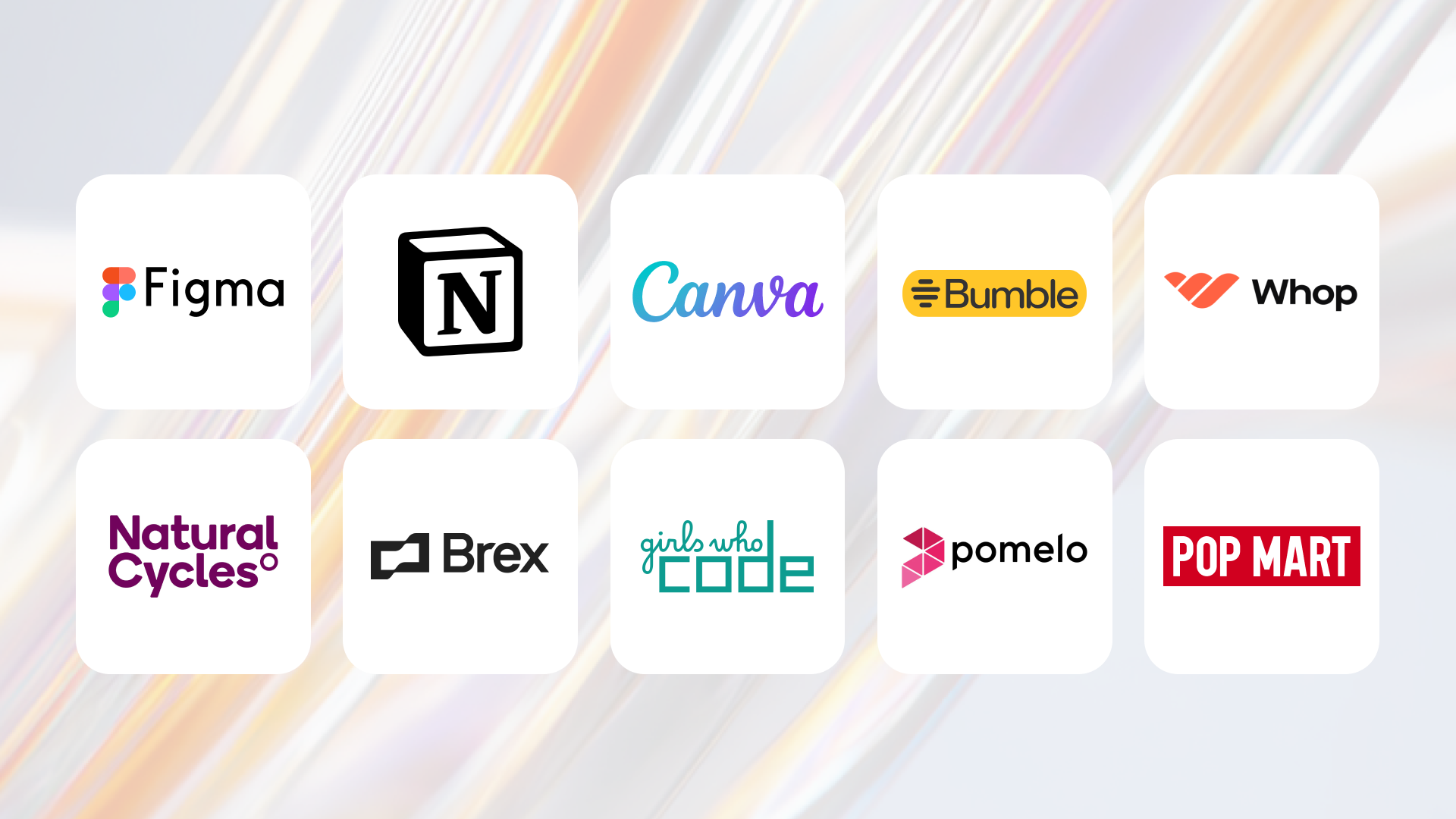Creating isn’t meant to be easy, especially for successful startup founders. A number quit their day jobs to take a chance on an idea that keeps them up at night. Many face well-intentioned doubts from loved ones. And when a founder overcomes one challenge, another problem arises.
Despite the difficulties of building a business, the satisfaction of creating solutions and doing good keeps inspiring founders hooked. Here are 10 entrepreneurs who overcame challenges and used setbacks as fuel for their success.
Dylan Field, Figma
After a college internship at magazine app Flipboard, Field wanted to explore the potential of design tools for the web. In 2013, he, alongside Evan Wallace, started Figma, a browser-based design application.
The design community, notorious for gatekeeping, didn’t share Field’s enthusiasm. “One of the comments on Designer News when we launched was, ‘If this is the future of design, I’m changing careers,’” shares Field in an interview. In addition to Figma’s four-year path to monetization, Field dealt with growing pains as a CEO and personal struggles—his father’s cancer diagnosis.
Thankfully, Field pressed on because Figma is the industry standard for product designers and web-based collaboration, and recently IPO’d for $33 per share.
Ivan Zhao, Notion
Notion is, arguably, today’s productivity tool of choice. The app boasts over 100 million users as of writing and a cult-like following among chronically online millennials and Gen Z. However, Notion almost shut down.
Founder and CEO Ivan Zhao set out to make a tool that enabled people to build custom software easily, much like stacking Lego bricks. “It didn’t work because the product was not understandable for most people,” says Zhao in an interview. “…We realized [to] be a big software tool, we have to start from a product that’s already ubiquitous.”
Zhao moved to Kyoto to rebuild the app and pivoted to a notetaking app. In 2020, Notion went viral in online productivity communities, and the rest, as they say, is history.
Melanie Perkins, Canva
In Perth, Australia, Melanie Perkins started a yearbook design company with her boyfriend Cliff Obrecht. Teachers all around the country used it instead of legacy design software. Perkins saw the potential to create a more general design software and flew to San Francisco to raise funds for this idea.
“We didn’t tick any of the boxes investors were looking for,” says Perkins in a blog post. Perkins and Obrecht didn’t come from technical backgrounds, and many couldn’t see how accessible design software benefits industries like marketing and education. Their start is one of many rejections startup founders face.
Perkins flew back to Australia and, after some searching, found a technical co-founder in Cameron Adams. Now, Canva has over 200 million users.
Whitney Wolfe Herd, Bumble
In 2012, Whitney Wolfe Heard quit her role as co-founder at Tinder and sued the company over sexual harassment and discrimination claims. In 2014, she launched Bumble, a dating app where women initiate conversations with their matches, instead of men in traditional dating.
“For all the advances women had been making in workplaces and corridors of power, the gender dynamics of dating and romance still seemed so outdated,” says Wolfe Herd in a blog post. “What if women made the first move, and sent the first message?”
Bumble counts 94,000 new users every day and makes 23 million new matches every week.
Steven Schwartz and Cameron Zoub, Whop
Steven Schwartz developed software to buy rare sneakers during drops in his teens. He met Cameron Zoub in an interest forum, and the two started a business selling the software together. “When we were growing up, people thought we were weird to be trying to do something entrepreneurial,” reflects Schwarz in an interview.
Over the years, they experimented with different businesses and brought developer Jack Sharkey into the fold. A friend showed Schwartz a site that sells software, which reminded Schwartz of the sneaker business he started with Zoub. The three created Whop, a software marketplace. “At our peak, I think we brought in like $100,000 per month [in revenue].”
Elina Berglund, Natural Cycles
How does one innovate in a space many cultures and communities find somewhat…stigmatized? Researcher Elina Berglund founded Natural Cycles, the world’s first FDA-cleared birth control app.
Natural Cycles uses an algorithm that checks a woman’s fertility cycle and body temperature to see when she is most fertile. The app provides women a hormone-free contraception option and—just like popular birth control methods—doesn’t guarantee a 100% success rate. Natural Cycles sits at 93%.
“You want to do something good,” says Berglund in an interview. “And then you have a woman contacting you because it failed for her, it’s super rough.” Despite these setbacks, Berglund and her team are optimistic in their mission, especially amid funding cuts in women’s health.
Henrique Duburgas and Pedro Franceschi, Brex
Like many Silicon Valley success stories, Henrique Duburgas and Pedro Franceschi got their start experimenting with software as teenagers in Brazil. The two entered Stanford University and entered startup incubator Y Combinator. There, they set out to create virtual reality software, but learned that their strengths as founders were in payments. They started Brex, an app that lets businesses manage and oversee cash flow. In two years, Brex was valued at over a billion dollars.
It seems smooth sailing for Duburgas and Franceschi, but the two encountered hurdles in 2023. Silicon Valley Bank crashed, and many companies turned to Brex as an alternative. This influx was a good problem to have, yet the Brex team barely slept for a few days. “ I could say that we knew exactly what was going to happen,” says Duburgas in an interview. “And, we had everything planned out, but the reality is we were just learning as we went through it.
Reshma Saujani, Girls Who Code
While Reshma Saujani campaigned for a congressional seat in New York, she noticed a gender gap in computer science classrooms. Today, only 24% of computer scientists are women. Though Saujani lost the elections, she used this experience to found Girls Who Code, a nonprofit that teaches girls computer skills.
“I learned that failure doesn’t break you,” she says in an interview. Girls Who Code has served over 760,000 girls, women, and nonbinary people to achieve gender parity in computing.
Gastón Irigoyen, Hernán Corral, and Juan Fantoni, Pomelo
Gaston Irigoyen was born and raised in Switzerland before moving to Peru and eventually settling in Argentina. At the time, Argentina experienced periods of hyperinflation, which Irigoyen still remembers.
After university, Irigoyen worked for Google Latin America and Naranja X, and then co-founded fintech Pomelo with Hernán Corral and Juan Fantoni. Pomelo lets Latin American businesses process, issue, and manage card payments. When pitching Pomelo to investors, the three didn’t have a complete product. Investors relied on the team’s previous experience.
“In many ways, we are trying to solve some of those structural issues that I saw firsthand growing up in the region,” says Gaston in an interview. “That has been motivational for me.”
Wang Ning, Pop Mart
If you’ve scrolled on TikTok recently or visited an upscale coffee shop, you would’ve encountered a furry, monster keychain with sharp teeth. These dolls, called Labubus, are part of Pop Mart’s portfolio of collectibles. The company, founded by Wang Ning, initially sold a host of products before pivoting to blind boxes and toys.
“Even in a small product category, a big business can emerge,” says Wang in an interview. “Our philosophy is: respect time and respect business.”
Now, Pop Mart dominates the collectible toy space through partnerships with artists and established IP, like Disney and DC Comics. Illustrator Kasing Lung created the Labubus for a children’s book in 2015 and teamed up with Popmart in 2019. Popmart also partners with artists Libby Frame and Xiong Miao for the Peach Riot and Skullpanda lines, respectively.
Wang, along with the aforementioned founders, proves that setbacks are opportunities to evolve and create solutions for customers. Sometimes, all you need is a little optimism ☀️



